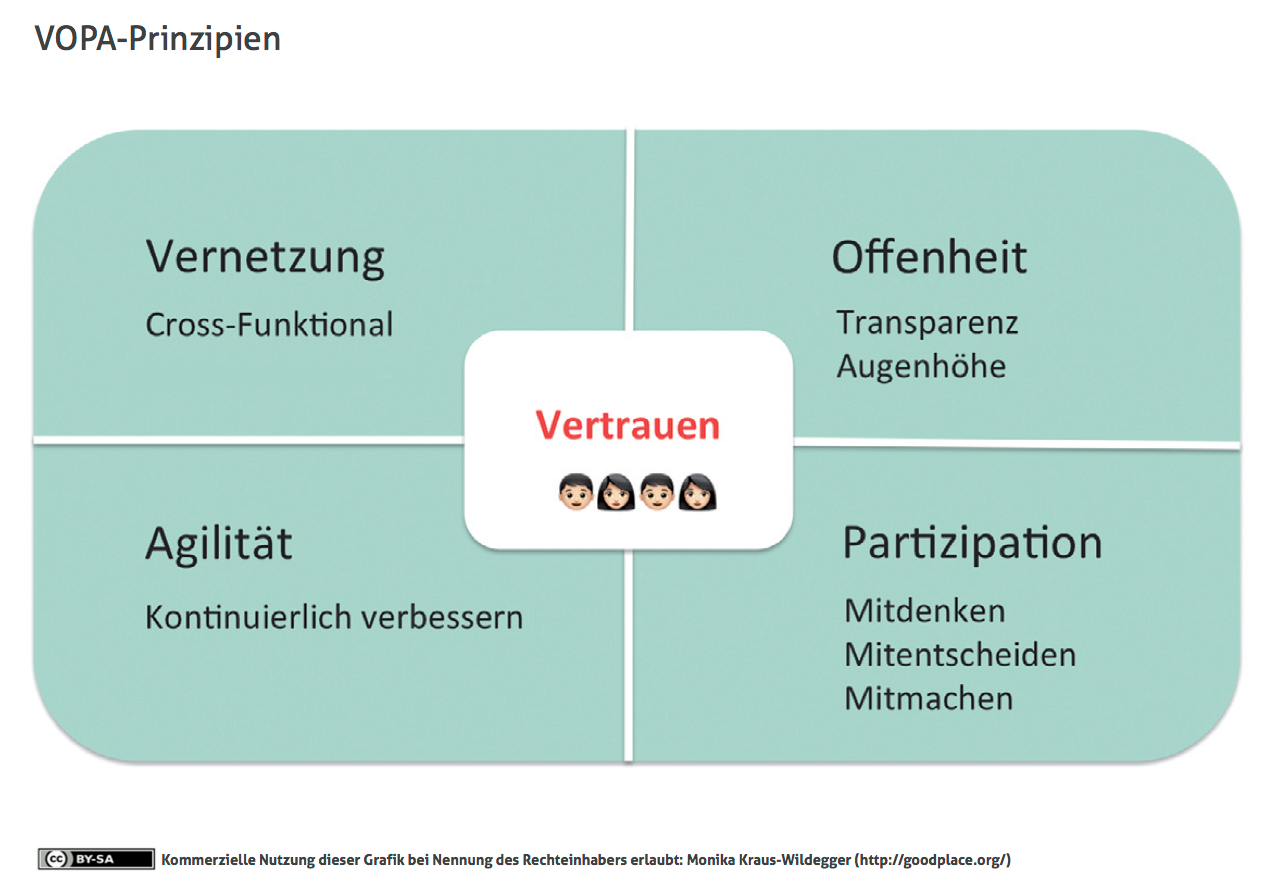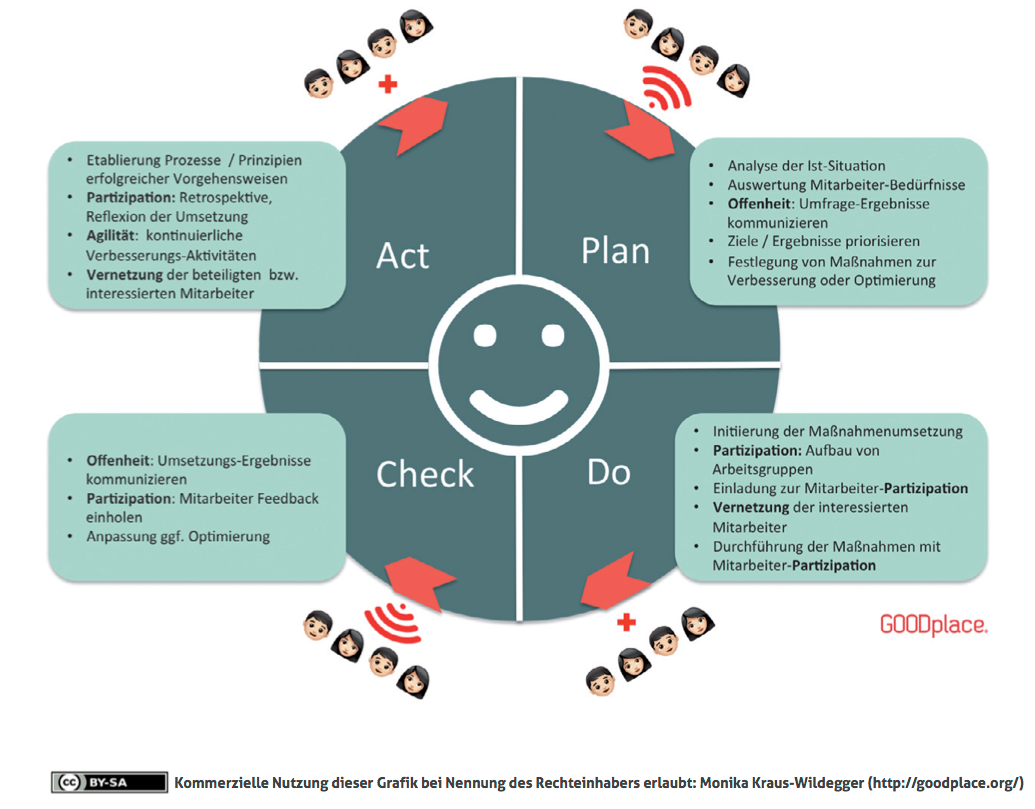2022-10-26 | Verena Stiegler | 6 min read
How to strenghten Self-Development and Trust with active Feelgood Management
Putting up fruit bowls, finally designing the company's own wellness area and humming "I feel good" around the office every morning to spread positive vibes - these are the tasks of a feelgood manager, aren't they?
Feelgood Management has become an established term in companies of all shapes and sizes over the last few years, although most people don't really know what it actually means. Our Feelgood Ambassador Luki has been supporting the mental and physical well-being of more than 200 employees at Scandio for almost a year now and explains to us what this fancy term actually stands for.
Feelgood Management - more than just foosball
The major concern of feelgood management is the successful relationship between employees and the company, which is ultimately reflected in the respective company culture. The focus of this relationship is on the common ground - how can both parties benefit from each other? Employees are invited to play an active role in shaping this relationship, to communicate their needs openly and thus to contribute to the company culture. This human-centered approach is supported by the two pillars of self-development and trust:
Self-Development
The path to change begins within myself. What do I need? What are my strengths? What strategies do I use to meet my needs and how am I actually doing? The pillar of self-development strengthens self-reflection, self-care, self-acceptance, self-confidence, self-compassion, and self-love. If I can understand and reflect on myself in a stronger way, this pillar helps me especially in communicating with myself and also with others.
Trust
Together we accomplish more - and have more fun! This pillar deals with cooperation and the potential to achieve more as a group within a company than the individual person would be able to. Communication, appreciation, feedback, teamwork, and an open learning and error culture are topics that help in one's own development and at the same time enable the company to make progress. I can always learn something from other people and their experiences if I meet them openly and at eye level.

Strengthening the two pillars of "self-development" and "trust" also strengthens the relationship between the company and its employees. After all, the success of a company also always depends on the well-being of its employees.
A fruit basket or the obligatory foosball in the kitchen may be nice-to-haves, but they have very little to do with genuine feelgood management. Rather, the needs of the individual as well as constructive cooperation within the company play an essential role here.
Does success make you happy or does happiness make you successful?
Positive psychology provides answers to this question through advances in brain research: Happiness makes people successful. Because happy people are 31% more productive, three times more creative and their accuracy increases by 19% - this benefits both the individual and the company as a whole.
As adults, we spend a large part of our waking hours in the context of work. Feelgood management therefore focuses on the positive experience of and participation in shaping one's own working environment. Similar to the Japanese Ikigai principle, people need goals and needs that they try to fulfill. In this context, the feeling of significance, the contribution of one's own strengths and the fun factor are decisive for overall satisfaction.
That which is worth living for
If my strengths, my passion as well as the sensory experience overlap in an activity and if I receive a sufficient reward for it, in Japan this is called Ikigai. In Japanese culture, thorough self-exploration and the pursuit of one's Ikigai are given great importance.
Listen to yourself: what activity evokes in you a feeling of joy and inner satisfaction?
No matter what it is, if you find more of your Ikigai in your daily work, you will be more productive and motivated.
Where I feel good, I want to stay
The "Engagement Index", which has been surveyed annually by Gallup for several decades, shows: The strength of employees' emotional attachment to their company is distributed similarly in percentage terms over time.
Employees are divided into three categories based on the strength of their emotional attachment to their company: high attachment, low attachment and no attachment. Depending on their affiliation with the respective category, employees exhibit specific behavior. For example, it was found that the 14% without emotional attachment have already resigned internally. This has a negative impact on the productivity of these individuals, dropping it below 30%. There is a high probability of losing these employees within the next year and that they are already actively working against their own company. In addition, the compensation costs of filling a vacancy are estimated at 1.5-2 years' salary. Thus, internal termination has a double impact on the company's bottom line. Not included here is the human loss for the company. Due to the high fluctuation, the performance of the teams generally decreases, as the group always falls back into the "forming" status due to new members.
On the other hand, employees who state that they have a high level of commitment to their company clearly outperform the other groups in terms of productivity and creativity. This is because those who see their own values reflected in the company can identify more strongly with their work and will achieve significantly better performance. In addition, recommending the employer to friends is much more likely, which reduces fluctuation and recruiting costs.

Money = Appreciation?
Appreciation is another important point in a positively lived corporate culture. This starts with the individual person: Do I know my own value? What do I value myself for? What behavior of other people impresses me? How do I value other people's achievements? If this appreciation is mutual within the company, a big step has already been taken in the right direction.
Salary is also a form of appreciation, but it has long since ceased to be the decisive factor for today's young professionals in deciding whether to work for a company. The appreciation of individual needs, such as flexible working hours and location or offers for personal development, have now successfully replaced salary as a decision-making and feel-good factor.
Strengthening trust between employees and the company - with the NOPA principle
Companies today find themselves in a so-called VUCA world. This acronym stands for Volatility, Uncertainty, Complexity and Ambiguity and describes the challenges for which companies must find solutions in order to secure their own future. The so-called NOPA concept has been developed as a solution approach. This stands for Networking, Openness, Participation and Agility. If these four principles are followed, employees' trust in the company, in their colleagues and in themselves can be significantly strengthened. Employees can actively help shape the company's path and contribute to the company's future security. Change is driven by the people who know the company best: the employees themselves.

And this is where the role of the Feelgood Ambassador steps in. He or she drives and accompanies the process of actively involving employees in shaping the company culture. Through internal and external workshops on topics such as mindfulness, stress, (inner) communication, personal strengths, gratitude, etc., the Feelgood Ambassador actively supports employees in working on the pillar of their own self-development.
Goodplace's Plan-Do-Check-Act cycle provides a useful guide to implementation here.
In order to be able to specify the needs of the employees, first of all a requirements analysis (PLAN) is needed, on the basis of which the further measures can be determined. In the next step, the Feelgood Ambassador takes care of the implementation and adherence to these measures (DO) by encouraging employees to participate in a targeted manner and by bringing together interest groups.
Feedback is key! After implementation of the measures is before improvement of the measures. To achieve the best results, processes must be continuously optimized and feedback must be openly communicated (CHECK).
If a measure proves to be effective, it can be firmly established within the company in the future (ACT). But here, too, the Feelgood Ambassador should make sure that the method continues to fit the structure of the company and the needs of the employees.

Help for self-help
At Scandio, our feelgood management is also strongly based on the principle of "helping people to help themselves". Regular discussions with all employees create an awareness of their own needs: How am I doing? What is stressing me out? What do I need to be able to work well? How can I become active myself?
The number of sick leaves in Germany due to mental health problems has increased enormously in recent years - we think this is a development that should be taken very seriously. That is why it is particularly important to give employees tools that they can use to initiate change themselves. A trustful working environment and an appreciative corporate culture are the basis of long-term success.
Continue reading here:
Diversity at Scandio - How we practice our values
How Scandio practices Work-Life-Integration
Scandiolife on Instagram.
Connect with us on LinkedIn.
Look what Scandio is tweeting.



